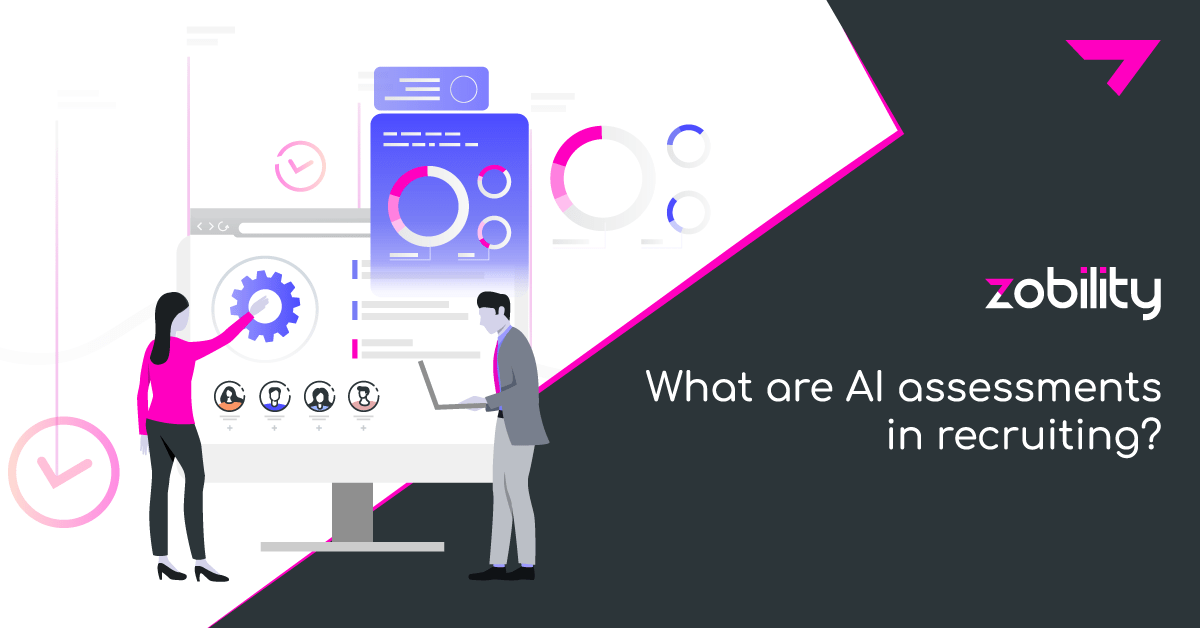As the application of artificial intelligence (AI) grows, more companies are using it to enhance their recruiting process and secure top talent. In this article, we’ll explore what AI assessments are in recruiting, their key benefits, and some considerations for implementing them.
AI assessments utilize machine learning (ML) algorithms to evaluate and score candidates on various attributes and skills needed for a given role. They are designed to automate parts of the recruitment process that would normally require extensive human screening.
Examples of how AI assessments are being used in recruiting:
- Video interviews that are analyzed with algorithms to assess verbal and non-verbal communication skills.
- Online coding tests which use algorithms to measure programming proficiency and accuracy.
- Personality tests that use ML models on psychometric data to evaluate traits like openness, conscientiousness, extraversion, etc.
- Gamified assessments that evaluate problem-solving abilities and cognitive function with gamification elements through job environment simulations.
- Resume screening automation that uses keywords, data points and other variables to rate and shortlist resumes based on job description.
The algorithms work by comparing candidates’ responses and performance to benchmark data on what constitutes a high quality response. They can quickly synthesize large amounts of data to determine which candidates most closely match the desired job profile.
Benefits of Using AI Assessments
When integrated thoughtfully, AI assessments offer several potential advantages:
- Removes bias: Algorithms can evaluate candidates based on objective criteria, rather than subjective factors like race, gender, or age. This promotes workforce diversity and inclusion.
- Saves time and resources: Rather than manually reviewing hundreds of resumes and conducting multiple interviews, recruiters can use AI assessments to quickly screen candidates and focus on more strategic tasks.
- Provides insights: Advanced analytics give recruiters deep visibility into candidates’ abilities including benchmarking, predictive analytics and skills gap analysis. This allows for data-driven hiring decisions.
- Improves candidate experience: Applicants can showcase themselves through interactive and engaging assessments. Candidates can also receive immediate feedback on their performance.
Considerations When Implementing
While promising, AI hiring tools are not foolproof. It’s important to ensure ethical AI recruitment practices. Companies should regularly evaluate and refine their AI assessments to ensure they are providing accurate and unbiased results.
Considerations to keep in mind:
- Results are only as good as the algorithm’s design. Assessments must be validated through evaluation to ensure they measure abilities accurately.
- AI cannot measure soft skills easily quantifiable like creativity and empathy. These still require human evaluation.
- Assessments should supplement, not replace, human decision-making. Recruiters provide critical perspective algorithms cannot capture.
- There are ethical concerns around data privacy. Steps must be taken to ensure candidates’ personal information is protected.
When used properly, AI assessments help hiring teams efficiently identify and engage with high quality talent. As adoption increases, organizations must invest adequately in assessment design, validation, and candidate experience to maximize value. With a thoughtful approach, this AI application can significantly transform the recruiting process.
About Zobility
Zobility, an RGBSI brand, focuses on providing innovative talent management solutions within the mobility and high-technology sectors. A range of our services include staff augmentation, managed service provider (MSP), vendor management (VMS), recruitment process outsourcing (RPO), and payroll administration.
Learn more about Talent Management Solutions
Download Talent Management Solutions Booklet
Follow us on LinkedIn


